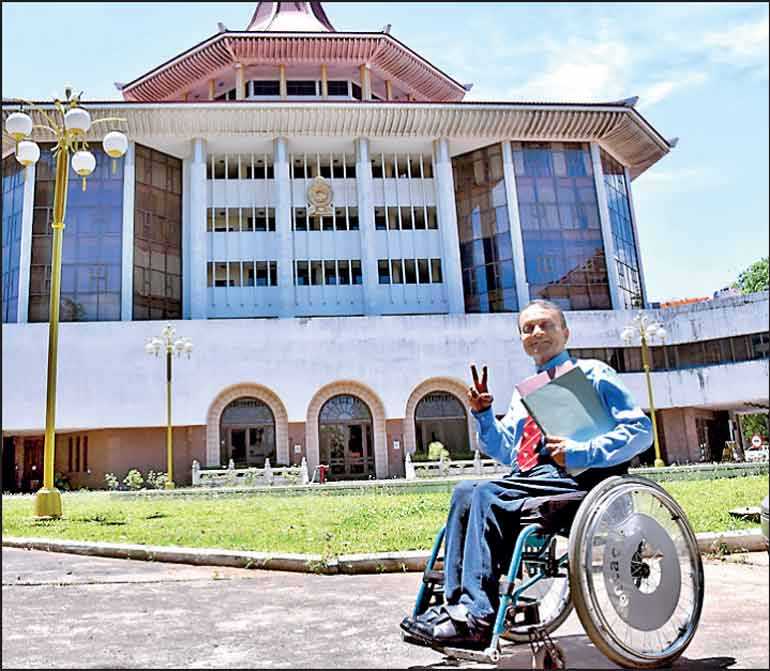Monday Feb 16, 2026
Monday Feb 16, 2026
Wednesday, 8 May 2019 00:00 - - {{hitsCtrl.values.hits}}

The Supreme Court recently issued several direction to six ministries, their secretaries and two Government authorities to take immediate effective measures to ensure the design and construction of all parts of new buildings, facilities and services the public needs to use – as defined in Clause 10 of the Accessibility Regulations No. 1 of 2006 – must be made easy and safe to access and use equally by all persons, in particular those with restricted mobility.
The Supreme Court bench comprising Justices Prasanna Jayawardana, Vijith Malalgoda and Murdu Fernando held that: “Beyond any doubt, there is continual failure on the part of the State and its agencies to implement to a meaningful degree, complying with and enforcing the provisions of the Act No. 28 of 1996 and Accessibility Regulations No: 1 of 2006 made under this Act that was even unanimously approved by the Parliament on 20 March 2007.”
As a result, the Supreme Court concluded: “There is continual denial of opportunity of equality and the protection assured by the provisions of this Act and thereby has violated the Fundamental Rights guaranteed by Article 12(1) and Article 14(1)(h) of the Constitution, to the Petitioner Dr. Ajith Perera and others similarly circumstanced with restricted mobility.”
In 2011, the Supreme Court ruled that people with restricted mobility form the country’s largest minority estimated at 20% of the population, i.e. four million.
The Supreme Court further recognised that the trauma of continual exclusion by man-built environments precipitates depression and potentially cripples precious human life – economically, socially and mentally.
With this ongoing adverse trend the next generation of persons suffering from mobility impediments – much larger than at present – will not be able to enjoy optimum benefits of mega-development projects and will face far worsening consequences, a national tragedy indeed.
Those institutions coming under the purview of the Minister of Provincial Councils and Local Government, Minister of Social Services and Social Welfare, Minister of Megapolis and Western Development, Minister of Housing and Construction, Minister of Education; Minister of Justice and Prison Reform along with Sri Lanka Tourism Development Authority and the Urban Development Authority were ruled as institutions that has continually violated the meaningful enjoyment of fundamental rights of disabled persons.
The Supreme Court further stated “the specific provisions of the Act to punish the violators, although in force for 23 years, have never been used” and directed the public to institute legal proceedings against any public officers, authorities, bodies and respondent(s) which breach and/or violate and/or fail to comply fully with these SC orders.
This landmark judgement made on public interest litigation fundamental rights application of national and international importance to Sri Lanka was filed under reference SCFR 273/2018 by Dr. Ajith C. S. Perera.
Perera, undeterred by his personal adversity and appearing at all times in person in a wheelchair since 2009, successfully pursued single-handedly this public interest litigation, recognised as a significant achievement by a disabled person for everyone.
Perera – a former senior manager in industry and a professional – is an internationally-recognised and widely-experienced accessibility rights activist and a consultant trained in England.